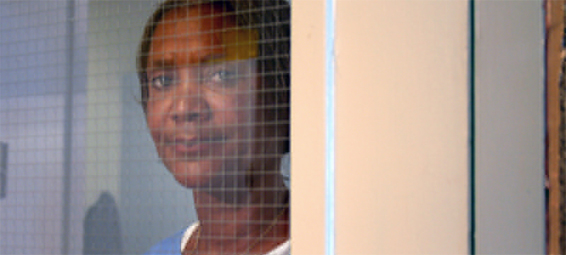One of the lawyers representing Debbie Peagler, the California inmate whose legal battle is documented in Yoav Potash’s Crime After Crime, places a very heavy burden on the case near the film’s end. If Peagler is granted parole, Nadia Costa says, then there is a glimmer of hope that America’s judicial system still works. If she is denied, everything is lost.
The feeling after Costa has made this statement is that it is perhaps not drastic enough. By the end of Crime After Crime, a film nearly a decade in the making, you get the sense that the American judicial system is already rank with corruption and abuse. Debbie Peagler’s case emerges as symptomatic of a byzantine, Kafkaesque legal trap that, once ensnared, good luck getting free.
Perhaps what is most compelling about the story of Debbie Peagler is that, unlike most exoneration stories, Debbie never claimed to be innocent. The woman was sent to prison in 1983 for hiring two gangbangers to murder her boyfriend, Oliver. But that crime is only part of the story. Debbie began seeing Oliver in high school, and after a brief stint of normality, he began beating her, eventually forcing her into prostitution. The abuse continued for years, and after Debbie gave birth to Oliver’s daughter, the man sexually abused the child. When Debbie tried to escape the cycle of abuse, Oliver and his cronies showed up at Debbie’s apartment with shotguns, threatening to kill the lot of them. Debbie was desperate. Attempts to have Oliver put in jail failed. She didn’t know where to turn, so she turned to two local gang members.
By the time we learn Debbie’s story, we don’t really care if she wanted the gang members to kill or just beat up and intimidate Oliver. Her situation was impossible, yet at the time of the crime, there was little recourse for a woman in Debbie’s position. The Los Angeles County district attorney tried to charge her with first degree murder, threatening the death penalty, so Debbie pled guilty and received life in prison in return.
The problem that emerges in the documentary is that the Los Angeles district attorney never had the evidence to accuse Debbie of first degree murder in the first place, implying that her life sentence was the product of an overly aggressive prosecution hell-bent on scoring another conviction. Debbie should have been charged with manslaughter, resulting in a maximum six year sentence. Now, twenty-six years later, Debbie doesn’t know if she’ll ever be free.
Debbie’s case comes to light when two lawyers, Costa and Joshua Safran, began working on the case as part of a larger effort to readdress the cases of inmates who suffered physical abuse in the wake of the passage of a California law that allows domestic abuse to be taken into consideration in such cases. The two lawyers thought Debbie’s case was going to take a couple of months to sort out. Instead, it became a near decade-long struggle that became a media sensation precisely because it exposed such blatant abuse on the part of the Los Angeles district attorney.
Crime After Crime is a frustrating movie and a necessary one for its exposure of judicial abuse. But besides its role as advocate or activist, the film proves a deeply moving story, driven on by Debbie’s own steadfast resilience and the increasingly invested emotions of her volunteer lawyers. Potash’s movie does what good documentaries do: take a strangers’ struggle and make it our own.





